| |
| |
| |
| Presented By Babbel |
| |
| Axios World |
| By Dave Lawler · Jul 28, 2022 |
| Welcome back to Axios World. - We start tonight's edition (1,953 words, 7½ minutes) with today's big Biden-Xi phone call.
- After that, we've got some great reporting from my colleague Niala Boodhoo about Russia's "filtration" system for Ukrainians in Russian-held territory.
New arrival? Subscribe. |
| |
| |
| 1 big thing: Xi warns Biden not to "play with fire" |
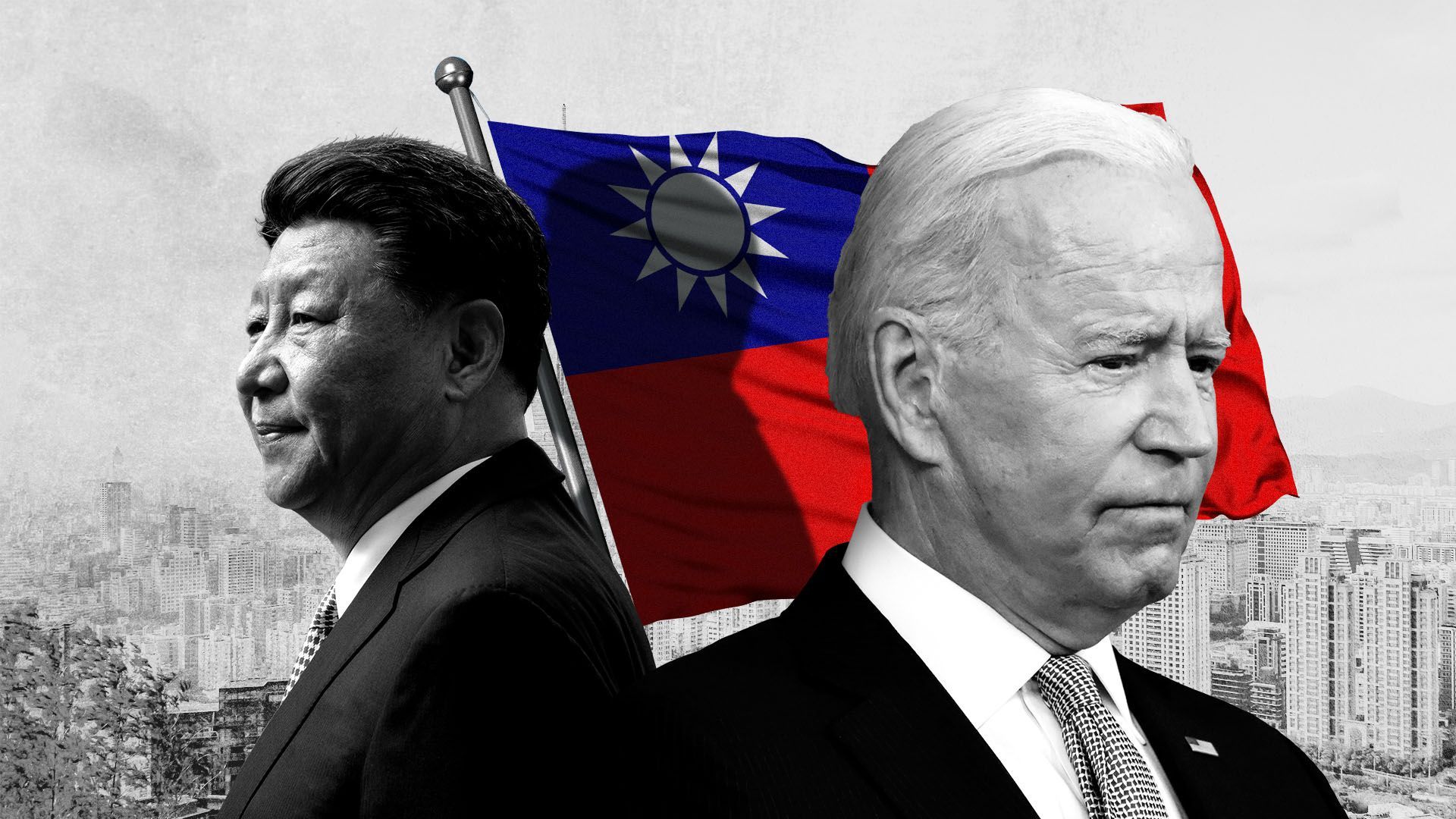 |
|
| Photo illustration: Sarah Grillo/Axios. Photos: Anna Moneymaker, Yorgos Karahalis/Bloomberg via Getty Images |
| |
| "Those who play with fire will perish by it." That was Chinese President Xi Jinping's message to President Biden today on Taiwan, according to Beijing's readout. Why it matters: Beijing has promised "serious consequences" if House Speaker Nancy Pelosi follows through with a planned visit to Taiwan. Little surprise, then, that Taiwan seems to have dominated a conversation that lasted two hours and 17 minutes. State of play: The Chinese government has repeatedly vowed to take control of the self-governing island, by force if necessary, and reacts furiously to any gesture that seems to treat Taiwan as an independent state. - Pelosi would be the most senior U.S. lawmaker to visit since 1997. A senior administration official briefing reporters on the call this evening declined to say whether her plans were discussed, or to confirm the wording of Xi's warning.
- The official did say the leaders discussed their "differences" over Taiwan, but noted that the U.S. and China have navigated those differences for four decades.
- Still, many experts and officials fear we're in a different era, with a growing risk of conflict over Taiwan. Biden seems to agree. He said publicly that the U.S. military thinks Pelosi's trip is "not a good idea right now."
- Flashback: Biden has previously said three separate times that the U.S. has committed to defending Taiwan, but the White House insists there's no change to the "strategic ambiguity" policy, under which the U.S. takes no explicit position on that issue.
Zoom out: Xi told Biden it was wrong to view the U.S.-China relationship in terms of "strategic competition" — phrasing often used by the White House — because the world's two biggest economies need to work together on key issues. - "Attempts at decoupling or severing supply chains in defiance of underlying laws would not help boost the U.S. economy," Beijing's readout added.
The other side: The White House noted the importance of open lines of communication between Washington and Beijing and said Biden and Xi instructed their aides to hold further discussions on climate, health security and drug enforcement. - One thing the leaders did not discuss, according to the U.S. official, is any potential action Biden might take on easing sanctions on China.
Behind the scenes: Biden took the call from the Oval Office, with Secretary of State Tony Blinken, national security adviser Jake Sullivan and three National Security Council officials — Jon Finer, Kurt Campbell and Laura Rosenberger — arrayed around him. - Beijing's readout stated that the call came at Biden's request. The senior U.S. official acknowledged Sullivan had been the first to raise the idea with his Chinese counterpart, but noted that the Chinese side had more recently "followed up" to nail down the timing.
- None of that really matters. But the fact that both sides felt the need to say the other wanted to talk hints at how defensive they can be about their standing in a relationship that — as both readouts stressed — is perhaps the most important in the world.
What's next: The U.S. official said Biden and Xi agreed to find a time to hold what would be their first face-to-face meeting since Biden became president. - One possible venue: The G-20 summit in Indonesia in November.
|
    |
| |
| |
| 2. Inside Russia's "filtration" system for Ukrainian civilians |
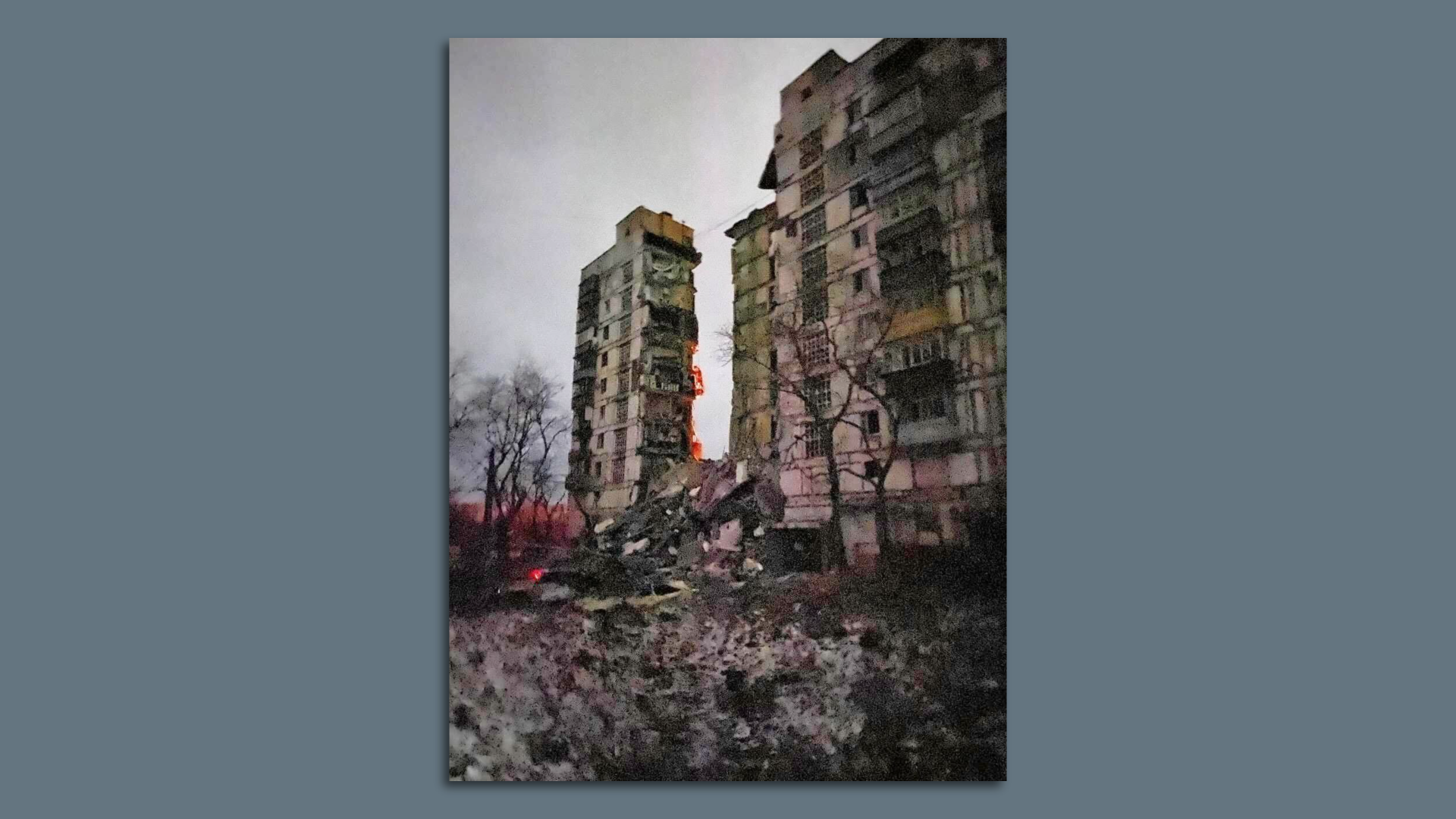 |
|
| A destroyed residential building in Mariupol that Ulyanchenko says is about 300 feet from his building. Photo courtesy of Taras Ulyanchenko |
| |
| Russian authorities have imposed a system of interrogation, detention and forced deportation for civilians in areas of Ukraine they now occupy. The big picture: The U.S. State Department estimates that between 900,000 and 1.6 million Ukrainians, including at least 260,000 children, have been through Russia's "filtration" process. - Many of these children, including some taken from their parents, are believed to have been adopted by Russian families.
- Many adults — particularly those suspected of working with the Ukrainian army or nationalist militias — are believed to be in Russian detention camps in eastern Ukraine, a recent U.S. intelligence assessment found.
Taras Ulyanchenko, a 21-year-old student from Mariupol who went through the filtration process, was more fortunate. He told his story to Axios Today's Niala Boodhoo: When the war started in February, Ulyanchenko was in his final year at Mariupol State University, studying political science. - After weeks of bombardment, Russian occupation turned Mariupol into "hell on Earth," Ulyanchenko says. His father, a factory worker, was killed by a Russian sniper, leaving him to care for his 80-year-old grandmother, who has cancer.
After six weeks in hiding, Ulyanchenko and his grandmother fled to Donetsk and then, with "no other option" to escape the war, to the Russian border. That's when he encountered filtration. |
    |
| |
| |
| Part II: An interrogation at the border |
 |
|
| Taras Ulyanchenko and his grandmother after they arrived in Georgia. Photo courtesy of Taras Ulyanchenko |
| |
| At the border, Ulyanchenko's grandmother was allowed through but he and several others were taken by a Russian soldier for questioning. - Inside the room were four Russian soldiers and a man — "the interrogator" — in civilian clothes holding a baseball bat, he says, adding that a former Ukrainian soldier who looked roughed up was also detained there.
- Ulyanchenko says he was told to take off his clothes so they could check for tattoos that might indicate a military regiment (he doesn't have any). During the strip search, he says he could see the former soldier being beaten in the leg with the bat.
- During the interrogation, detainees were given questionnaires that asked what they thought about the Russian and Ukrainian governments, Russia's "special operation" in Ukraine, and Ukrainian nationalistic battalions.
Ulyanchenko tells Axios that the interrogator took his phone to check all of his social media accounts while questioning him. - When asked whether he had taken part in the 2013 protests that toppled Ukraine's Russian-backed president, Viktor Yanukovych, Ulyanchenko told his interrogator he was only 12 at the time.
- Asked if he was now a Nazi, Ulyanchenko immediately said "no."
- "With every new question, he was raising his voice at me a bit more, and this tension was growing bigger and bigger," Ulyanchenko explains. "This was a scary experience. ... But I promised myself not to react and to do everything to make it through."
He did make it through after about five hours, and he has since been able to travel to Germany. Many others have been less fortunate. - A recently declassified U.S. intelligence assessment found that detainees typically face one of three fates: Some are given documentation and allowed to remain in Ukraine; others are forcibly deported to Russia for additional screening; and "those deemed most threatening" are likely detained in prisons in eastern Ukraine and Russia, "though little is known about their fates."
Read the full story and listen to the podcast. |
    |
| |
| |
| A message from Babbel |
| Get conversational in a new language |
| |
 |
| |
| Babbel offers bite-sized, 10-minute language lessons developed by over 150 linguists and voiced by native speakers. The impact: Users report being able to have a basic conversation after just three weeks of daily practice using Babbel. For a limited time, get up to 60% off your subscription. |
| |
| |
| Bonus: Where in the world? |
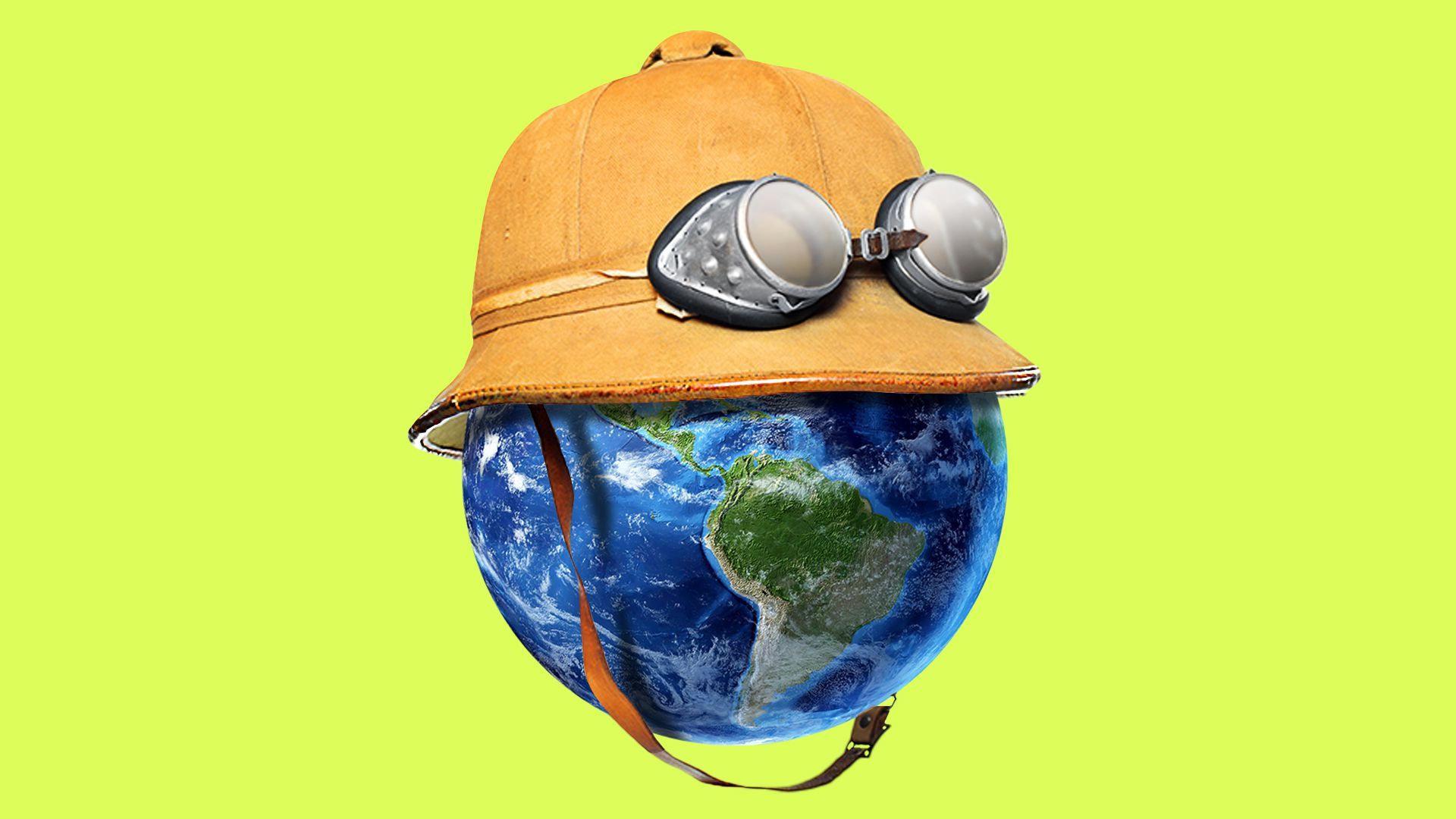 |
|
| Illustration: Natalie Peeples/Axios |
| |
| Another day, another puzzle. Can you name the two countries to which all five clues apply? - Has a Mediterranean coast (22 countries left).*
- UN member-state with a pop. of 2+ million (17 countries left).
- Coastline is more than 50 miles (15 countries).
- Islam is the biggest religion (9 countries left).
- Arabic is not a primary language (2 countries).
*Excludes overseas territories. Sorry U.K./Gibraltar. Scroll to the bottom for the answers. |
    |
| |
| |
| 4. Global news roundup |
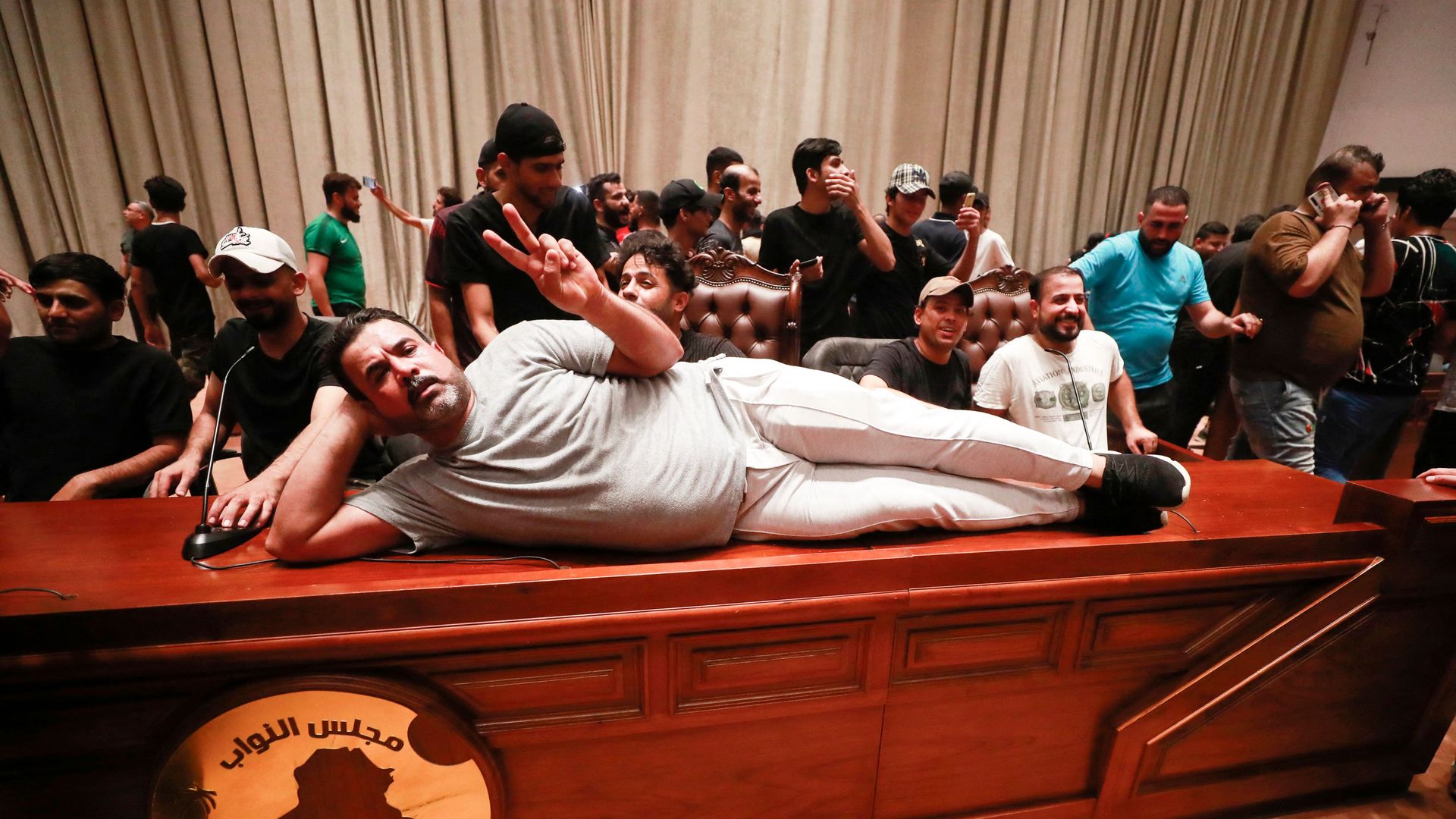 |
|
| A protester lies on the desk of the speaker of the Iraqi parliament. Photo: Ahmad al-Rubaye/AFP via Getty. |
| |
| 1. Supporters of cleric Muqtada al-Sadr breached Baghdad's secure Green Zone and stormed Parliament yesterday. - Backstory: Sadr's faction won a plurality in elections last October, promising to reduce the influence of both Iran and the United States. In the nine months since then, no one has been able to form a government.
2. At least 15 people have been killed in several days of protests in the eastern Democratic Republic of Congo against the presence of UN peacekeepers, whom the protesters accuse of failing to protect civilians. Three peacekeepers were among those killed when protesters raided their compound in Goma. - The region faces severe violence and instability despite hosting the world's second-largest UN peacekeeping mission. Politicians had whipped up anger at the UN before the protests, per NYT.
3. The focal point of the war in Ukraine could be moving to the south. - Driving the news: The U.K. Ministry of Defense says Ukraine's counteroffensive in Kherson in southern Ukraine is "gaining momentum," Axios' Ivana Saric writes. Ukraine has reportedly destroyed a bridge that was critical to Russian resupply efforts.
- Yes, but: A senior Ukrainian official warned that Russia was conducting a "massive redeployment" of forces from Ukraine's east to the south.
- Meanwhile, Russian missiles struck the Kyiv region for the first time in several weeks today, injuring 15 civilians.
4. White House Middle East coordinator Brett McGurk told a group of think tank experts last week it's "highly unlikely" that the 2015 nuclear deal with Iran will be revived in the near future, Axios' Barak Ravid scoops. - On the same call, McGurk said Saudi Arabia and the UAE have "more to give" in terms of increasing oil production.
5. England and Germany will square off Sunday in the Euro 2022 final. The tournament has drawn massive TV audiences in what seems to be a breakout moment for women's soccer in Europe. |
    |
| |
| |
| 5. The view from Washington |
 |
|
| Illustration: Shoshana Gordon/Axios |
| |
| 1. Secretary of State Tony Blinken expects to speak to Russian Foreign Minister Sergei Lavrov "in the coming days" for what will be their first call since the invasion of Ukraine. - On the table: A U.S. proposal for Russia to free WNBA star Brittney Griner and former Marine Paul Whelan, reportedly in exchange for notorious arms dealer Viktor Bout. Russia says there's no deal yet.
- Between the lines: Blinken had previously refused to speak with Lavrov for five months, and he was careful to note that this call is "not a negotiation about Ukraine."
2. Three big pieces of news from Capitol Hill this week could have major foreign policy implications: 3. The Uvalde school shooting and the end of Roe v. Wade appeared to take a major toll on views of the U.S. in Europe, Morning Consult found.  Data: Morning Consult; Chart: Baidi Wang/Axios |
    |
| |
| |
| 6. One to watch: Russia to exit Space Station |
 |
|
| Illustration: Sarah Grillo/Axios |
| |
| Russia is planning to pull out of the International Space Station after 2024, potentially closing the book on the nation's close relationship with the U.S. in space, Axios' Miriam Kramer reports. Why it matters: During times of high tension on Earth — like during Russia's annexation of Crimea in 2014 and today's ongoing war in Ukraine — space has often been one of the only open avenues of communication between the two nations. - It's also not clear if the space station can remain operational without Russia after 2024.
- NASA is planning to send astronauts to private space stations after the end of the ISS, but those stations likely won't be available until the late 2020s.
- Yes, but: Russian officials have told their U.S. counterparts they don't plan to abandon the ISS until their own space station is operational, per Reuters, which likely won't be until at least 2028.
What to watch: The Moon is quickly becoming the focal point of geopolitical intrigue in space as attention turns away from the ISS. - NASA is working with multiple ISS partners for its Artemis program to send people back to the lunar surface.
- Russia, on the other hand, has committed to partnering with China to build a research station on the Moon.
|
    |
| |
| |
| 7. Stories we're watching |
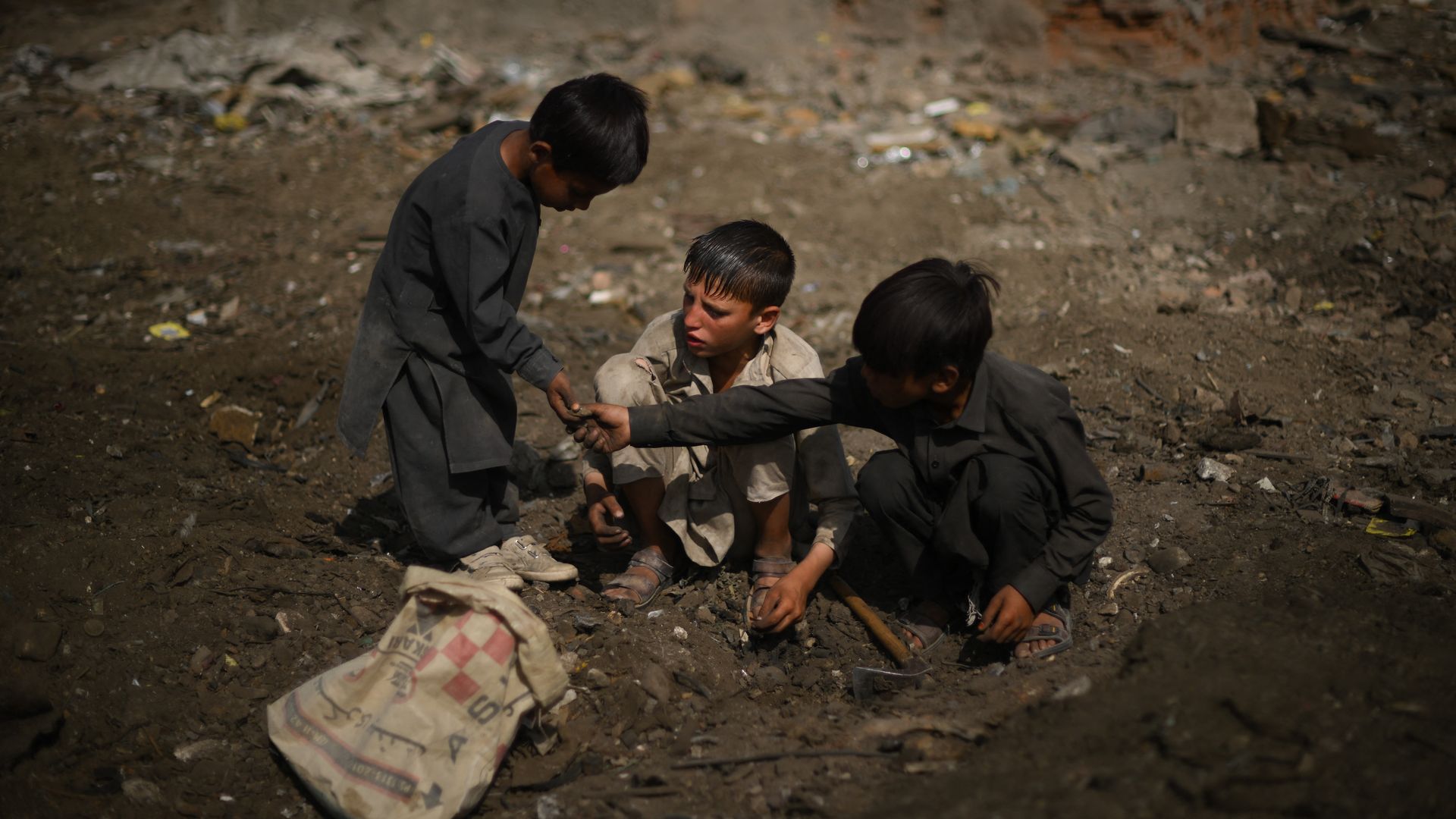 |
|
| Children scavenge for scrap metal in Kabul, Afghanistan. Photo: Daniel Leal/AFP via Getty |
| |
- Slowdown in China
- IMF slashes forecasts for global economy
- Bolsonaro's election fraud claims
- Taiwanese seek civil defense training
- The Russia sanctions bite
- Chinese officials attempted to infiltrate the Fed: report
- Xinjiang paramilitary group has "central role" in genocide: report
Quoted: "I'm afraid I'll be caught for not drinking." ... "There's cocaine, alcohol and hookers like I haven't seen in southern California." — Two businessmen describing the current climate in... Saudi Arabia. They're quoted in a new profile of MBS in the Economist. |
    |
| |
| |
| A message from Babbel |
| Start speaking a new language in just 3 weeks |
| |
 |
| |
| Babbel helps millions of people speak and understand a new language through its scientifically proven teaching method. The deets: The platform offers multiple ways to learn a language through daily lessons, podcasts, games, live online classes and more. Get up to 60% off your subscription. |
| |
| Answers: Albania and Turkey. |
 | | Are you a fan of this email format? It's called Smart Brevity®. Over 300 orgs use it — in a tool called Axios HQ — to drive productivity with clearer workplace communications. | | |













No comments:
Post a Comment